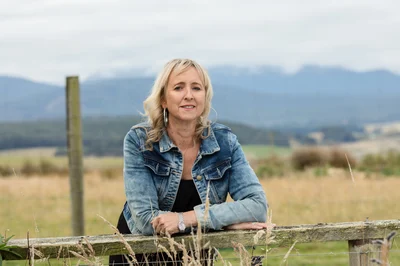How values can guide us

As a farmer's wife and counsellor specialising in rural mental health, Kathryn Wright is well-versed in the challenges facing rural communities.
A recurring theme often present in Kathryn's counselling sessions with rural clients is overwork or overwhelm.
For farm owners and operators, this often stems from real or perceived financial pressure from banks or the strain of appearing competent and keeping up, Kathryn says.
"If they feel like they've 'dropped the ball' somehow, they think they will be judged, or people will see what is happening.
"So the overwhelm or overwork leads to a serious loss of time, which can impact them doing the things that give their life value."
Sport, time with friends and holidays may all drop away due to time constraints, issues which are not limited to farm owners but can also affect farm workers.
"There are some bosses, certainly not all of them – there are some good ones out there – that expect the world from their workers."
Kathryn says that while the nature of farm work can mean it's tempting to have staff on standby on their days off when jobs are their responsibility, such as unloading a stock truck, for example, it's not sustainable.
"There still needs to be pockets of time where they are off the clock and aren't expected to do anything.
"Sometimes they need to get away from the farm to do that."
Farm succession and family farm partnerships are other common issues Kathryn sees her clients struggling with.
"It could be a sibling partnership, or Mum or dad are still on the farm and trying to step back and let their kids take over, but still not really letting go of the reins."
Generational differences and lack of communication around farm business decisions can cause interpersonal conflict and hurt between family members.
Younger generations tend to be the ones that suffer as the older generation often doesn't see there is a problem, Kathryn says.
"The solution is communication and for the older generation to try and see the younger generations' viewpoint.
"A lot of that is working through the anger and frustration to come into some form of collaboration.
"It's hard, and it's ongoing.
"I've seen so many of the younger generation have to leave and work somewhere else to work because it's just untenable.
"It's heartbreaking."
Increasing government and environmental regulations add to stress levels and feelings of uncertainty.
"There's always that threat of wondering when things will become unsustainable, how they will pay for things and what will happen if it becomes unviable.
"It's always there, in the back of people's minds, and we know they are doing their best.
"They care about their environment, and they care about their stock.
"I haven't met a farmer who doesn't."
Kathryn suggests looking at on-farm stress and conflict through the lens of your core values when searching for solutions or ways to cope better.
"Values are things that are important to you, that guide you through life, kind of like a compass that directs you to what matters to you," Kathryn said.
Kathryn helps her clients establish what their values are and then guides them to look to those values when addressing a problem.
If a person's value is patience, the answer may be to wait out a solution.
If one of their values is social connection, that may look like joining a Young Farmers Club or taking up a sport.
"If someone wants to give this a go, there are loads of value lists you can download online.
"Go through them, highlight the ones that matter to you, and then think about whatever problem you are having, whether it be succession or overwhelm, for example.
"If you were to bring those values to the fore, what would that look like in terms of showing up in the situation?
"How are you making decisions, and do they align with your values."
When issues like government regulations can cause farmers to question whether they want to stay farming, Kathryn recommends remembering what values brought you into agriculture in the first place.
That could be wanting to raise your family outdoors, guardianship of the land or animals, or not working in an office.
"In those moments when you think you just can't do this anymore, go back to those reasons and remind yourself what they were back then because they are likely to still be the same," Kathryn said.
by Claire Inkson

